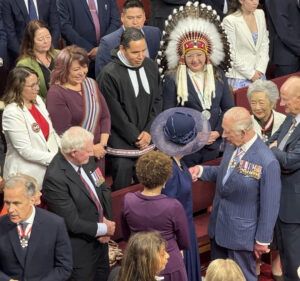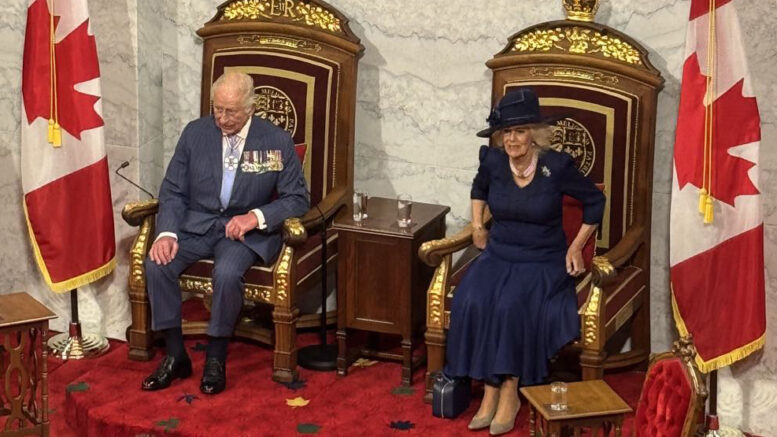by Kinnukana, Local Journalism Initiative Reporter
(ANNews) – On May 27, 2025, King Charles III, delivered the Speech from the Throne as King of Canada, opening the 45th Parliament with words that acknowledged the historical and ongoing presence of Indigenous Peoples and their unceded territories. His speech marked an important commitment toward ongoing reconciliation and it must be seen as more than ceremony. It is a binding commitment that the Canadian Government should be held accountable to, in both policy and practise.

First Nations, Inuit and Metis leaders meeting the King and Queen.
King Charles opened the Speech with a formal land acknowledgement recognizing that everyone at the Senate was gathered on the unceded territory of the Algonquin Anishinaabeg people. King Charles also acknowledged the Indigenous peoples land he was on and where Canadian’s are fortunate to live. He said, “To the First Nations, Inuit, and Métis Peoples – you have welcomed my family and myself to your traditional lands with great warmth and hospitality, for which I am humbly grateful.” This land acknowledgment was more than a formality. King Charles stated that “this land acknowledgement is a recognition of shared history as a nation.” It is a recognition of Indigenous sovereignty and a call to remember the shared history between Indigenous Peoples and the Crown.
The King said, “While continuing to deepen my own understanding, it is my great hope that in each of your communities, and collectively as a country, a path is found toward truth and reconciliation, in both word and deed.” King Charles’ emphasized the importance of reconciliation, not just speaking about it but also showing it through action. These words set an expectation, not only for respect and recognition, but for accountability. Reconciliation requires practical, measurable steps toward justice, healing, and true partnerships.
King Charles emphasized the government’s role as a “reliable partner to Indigenous Peoples,” committing to “long-term wealth and prosperity” and embedding the principle of Free, Prior, and Informed Consent (FPIC) in all nation-building projects. This is a critical legal and moral standard rooted in the United Nations Declaration on the Rights of Indigenous Peoples (UNDRIP), which Canada has committed to uphold. This commitment is especially important as Canada fast-tracks major infrastructure and resource projects, some of which impact traditional territories. Reducing project approval timelines from five to two years cannot come at the expense of meaningful consultation or environmental protection. First Nations, Inuit and Métis must not be bypassed in the rush for economic development, especially when history has shown how often their rights are overlooked in the name of progress.
While the presence of National Indigenous Organizations (NIOs) at the Speech from the Throne, such as the Assembly of First Nations, Inuit Tapiriit Kanatami, and the Métis National Council, is significant, it is important to recognize that these national bodies do not represent all Indigenous voices across Canada. Many grassroots leaders, hereditary chiefs, regional councils, urban Indigenous organizations, and community advocates also hold authority and bring forward critical perspectives. The principle of FPIC must apply not just to government negotiations with recognized organizations, but also to meaningful engagement with Indigenous communities at the local level. FPIC ensures that Indigenous Peoples have the right to be fully informed and freely decide whether or not to consent to proposed policies, developments, or projects affecting their rights, lands, and lives. Upholding this standard means listening to a broad range of voices and respecting diverse governance systems and knowledge holders.
The speech also spoke about initiatives to protect Canadian sovereignty and strengthen the military, particularly in the North. As Arctic security becomes a national priority, the Government must ensure that Inuit communities are full participants in shaping what protection looks like on their homelands. When the Government speaks of changing firearms licensing while “protecting the rights of law-abiding gun owners and Indigenous Peoples’ longstanding hunting traditions,” it must be transparent and consultative. Any reforms must preserve constitutionally protected harvesting rights and align with Treaty agreements.
King Charles spoke of nature as being central to Canada’s identity and pledged to protect more land through national parks and conservation initiatives. Yet many of these lands fall within traditional Indigenous territories. True protection of these lands cannot happen without Indigenous stewardship at the forefront. Indigenous knowledge systems, land ethics, and cultural connections to the environment must be integrated as leadership roles, not just advisory.
The King’s Speech reminded Canadians of the Crown’s evolving role over the past 70 years, including full independence and constitutional repatriation. Yet for Indigenous Peoples, sovereignty was never ceded. The Crown and the governments acting in its name must uphold the spirit and intent of the Treaties, which are living agreements.
King Charles III’s Speech from the Throne was historic and carries moral weight. It reaffirms the Crown’s duty to act in true partnership with Indigenous Peoples. These words must become mandates of the government and these intentions must be monitored and the vision of reconciliation should be shared, not imposed. The responsibility now lies with the Canadian Government to turn these words into action by respecting land rights, ensuring economic equity, protecting Indigenous languages and cultures, and embedding Indigenous leadership in every decision that affects their people and lands. We must continuously hold the Government to these promises.



Be the first to comment on "From Ceremony to Commitment: What is the meaning of King Charles III’s Throne Speech?"